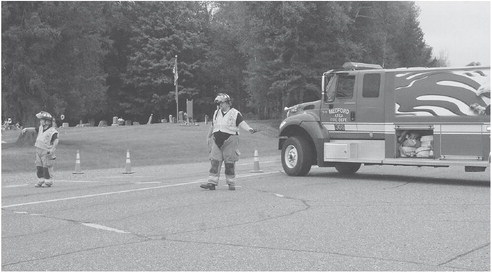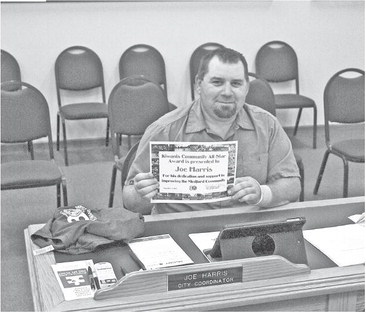Deputy offered for two villages


Sheriff proposes that Curtiss, Dorchester share law officer
Two area villages without active police forces have been offered the opportunity to share a county deputy who would patrol their communities on a regular basis and enforce local ordinances.
Clark County Sheriff Scott Haines and chief deputy Jim Hirsch approached the village boards in both Curtiss and Dorchester last week with a proposal to provide contracted police protection.
“This area definitely needs an officer dedicated to this area,” Haines told Curtiss officials.
Dorchester’s meeting with Haines and Hirsch was held in closed session, for “negotiation” purposes, but the board plans on discussing the proposal in open session at a special meeting tonight (Aug. 11) at 7 p.m.
Hirsch presented Curtiss board members with a variety of scenarios for how the new position would be paid for, depending on how much time the deputy spent in each community.
As an example, he said Curtiss could pay 20 percent of the deputy’s wages and benefits in exchange for the deputy spending approximately 20 percent of his or her time in the village. The startup costs of adding a deputy, such as purchasing a new squad vehicle with equipment, would also be split based on how much each village planned on utilizing the officer.
Dorchester has been without a police department since the longtime chief retired last July, and Curtiss has never had a police force, at least not in modern times. Right now, both villages rely entirely on county deputies to respond as soon as they are available, and those deputies are not allowed to issue citations for violations of local ordinances.
Hirsch told Curtiss officials that sharing a full-time deputy might be the best option for the two municipalities, especially when it comes to the budgetary impact.
“If Dorchester can’t afford a full one and you guys can’t afford a full one, maybe you can kind of split it,” he said. “It kind of made sense to me.”
Based on numbers provided by Hirsch, the total start-up costs of adding a new deputy — which includes purchasing a fully equipped squad vehicle and paying union salary and benefits — would be $177,978.
If Dorchester was to pay for 80 percent of the deputy, the upfront costs would total about $142,400, with Curtiss paying the remaining $35,600. After that, the ongoing annual costs would be about $24,000 for Curtiss and $95,000 for Dorchester.
Hirsch said his numbers are based on the highest paid position, a night sergeant, which would cost a total of $109,839 in wages and benefits. He said he’d rather start with a high-end estimate and come in below that than start with a figure that turned out to be too low.
“Odds are, we’d probably hire a new offi cer, which would be a lower wage on the wage scale,” he said.
Besides the 20 percent scenario, Hirsch also provided costs for Curtiss to split the position 50/50 with Dorchester or to even fully fund a full-time officer itself.
Trustee John Unruh noted that the village’s entire property tax levy would not be enough to pay for 100 percent of the cost of a full-time officer.
“I don’t think our budget could handle more than 20 percent,” Unruh said.
Hirsch said the actual split in time and money is something that Dorchester and Curtiss will have to hash out on their own.
“You kind of have to weigh it out,” he said. “That would be your decision.”
Regardless of the percentage split, the deputy would be expected to spend an amount of time in each village equivalent to what each municipality is paying — though the schedule would be flexible. For example, when Dorchester is hosting Dorchester Days, Hirsch said the deputy would likely spend more time there, but then make up for it by spending more time in Curtiss the following week.
Since there would only be one deputy assigned to the two villages, Haines said the coverage would not be seven days a week, so they would have to work out a schedule.
If approved, the new deputy would start in January of 2022.
Haines said they are approaching the villages now because later this month, they have to present the department’s 2022 budget request to the county’s finance committee. If the villages are willing to contribute financially to a new deputy, he said it would help their case when asking to add a new position.
“You have some time to think about it, but like Scott said, our budget is due in front of a committee later on this month, so the sooner the better,” Hirsch said.
Hirsch assured village officials that they are not being asked to supplement the sheriff’s department budget.
“We’re not making any money on it,” he said. “We don’t want to lose any money on it, either.”
Ordinance enforcement
One of the most vexing problems for both Dorchester and Curtiss is the lack of local ordinance enforcement.
At last week’s meeting, Curtiss trustees adopted an ordinance making it illegal to use “jake” brakes in the village unless it’s an emergency. The ordinance includes a range of fines between $100 and $1,000 for each violation, but without a local officer to issue tickets, there is no way of enacting theses penalties.
“The county cannot enforce local ordinances,” Haines told the board. “The county can enforce our ordinances, and then those fines would come back to the county instead of to the village.”
Likewise, Dorchester’s village board passed a motion last week making it illegal to park on a portion of Fourth Street that narrows considerably, causing safety concerns.
Both villages plan on putting up street signs announcing the new rules, but without a local officer to enforce them, the officials will have to hope that motorists just follow the signs.
Hirsch said this would change if the villages were to sign a contract with the sheriff’s department.
“As long as we have a written contract that provides police services for the village of Curtiss, we can enforce your village ordinances,” he said. “If we don’t have that, we can’t enforce them.”
Having a local officer with ticket-writing abilities could also generate at least some revenue for the villages since they would be able to keep a portion of whatever fines are assessed.
“That’s all dependant upon how many tickets they write and the dollar amounts associated with those tickets,” Hirsch said.
The villages may also encounter some costs if someone contested a citation, and the village attorney was needed in court. The deputy may also have to appear in court in those cases, but Hirsch said their time would be part of the budgeted costs, which includes some overtime.
Overtime may also be needed when unexpected incidents come up, such as a domestic disturbance or traffic accident, Hirsch said. Currently, whatever deputies or other officers are available respond to those types of emergency calls.
The sheriff’s department previously contracted with Dorchester to provide regular patrols in the village during the first half of this year, but that ended in June because the manpower was needed elsewhere in the county.
“Quite frankly, there’s a shortage of law enforcement officers, and other workers too, as you can see help wanted signs in any business,” Haines said.
However, Haines said the villages would not have to worry about the hiring process, which would be completely handled by the sheriff’s department, as would the officer’s required 24 hours of yearly training on firearms and emergency vehicle operation.
“All of that stuff would be taken care of by our agency,” Haines said.
With four new apartment buildings being built in Curtiss, the village’s population will nearly double. This will likely increase the need for more police presence, while the buildings themselves will also provide extra property tax revenue to the budget.
One of the apartment buildings will be partially added to the tax roll starting next year, Unruh said, but the other three won’t be added until the year after that.
“We’ve definitely thought about it,” he said, referring to hiring a police officer. “It definitely comes down to how much we can spend.”



